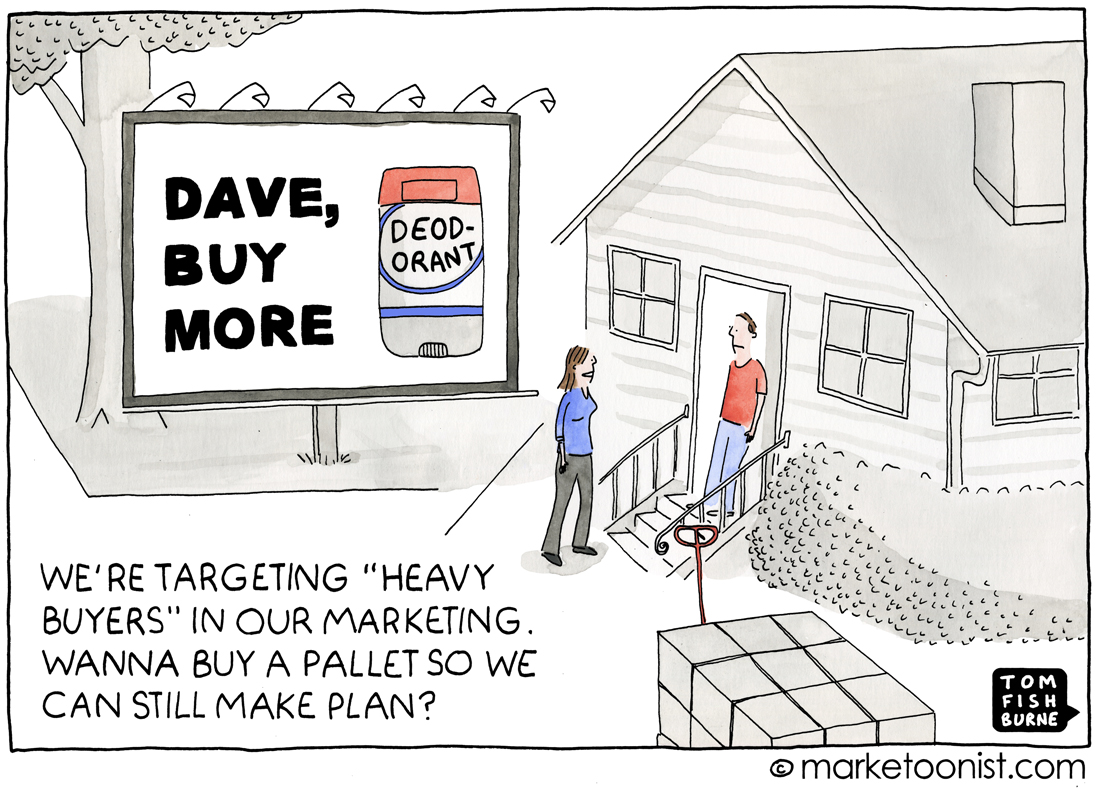
Since the late 70's we've been told the blessings of 1-1, CRM, Personalized, customized, data driven, customer-centric and targeted marketing. But what are the down-sides?
First, I do not know what I will buy next... and neither do you. A gift-redemption company asked me to build a data model on what people might redeem. I asked, "If you know that I play golf, do you think it is more or less likely that I choose the set of golf clubs?" "Obviously more they replied". "But I already HAVE clubs, and if I'm serious about golf, I would never pick the free set." I think it is far less likely... and so it went. So when we presume to guess who will buy, our targeting is rarely more than a coin flip.
Second, when we target who will buy, we aim away from who won't buy. The marketers above were so sure about Dave, they spent heavily to get Dave's attention. A music company told me, "Our buyer profile is men, 35-55, high income & high education. But when we contact those kind of people our results are awful." I tried not to smile as I thought about the ratios. They had narrowed their focus to less than 10% of adults, while forgetting that not all their listeners even fit the profile. I recommended that we market to those who were already buying (we know they like the music) and the results were spectacular. Don't think that a precise target will necessarily bring better response - or greater sales.
Third, the best use of segmentation is to set up experimental tests - to learn. And while everyone wants to target and measure, few marketers take the time to set up field valid testing. A major auto manufacturer called me in and asked, "Who would have bought a car, without the $5,000 rebate." "Great question, what answer would you like?" "But we thought you were a data guy?" "Right, but I doubt that you did a hold out test - so without any data - what answer?" Never forget that one perfect customer (Dave) will not compare with a million marginal ones. Most customers do not think of you as their friend and they did not spend enormous amounts of time contemplating their needs. Even with major purchases, until the wash machine dies, the water-heater floods the basement or the check-engine light blinks, most consumers ignore your messages related to these categories. But once it happens... they are more likely to buy - more highly motivated - than any of your customer personas.
In conclusion, a great offer which attracts the attention of a wide audience is a far better goal than perfect target marketing. Never forget that your market is often a moving parade and most people have never noticed your product. Targeting precision can reduce both overall reach and your capability to learn. If marketing is "finding a need and filling it" and even you do not know tomorrow's need - remember "Sow your seed in the morning, and don’t stop working until evening, since you don’t know which of your endeavors will do well, whether this one or that, or even if both will do equally well." Solomon (the richest man who ever lived)
